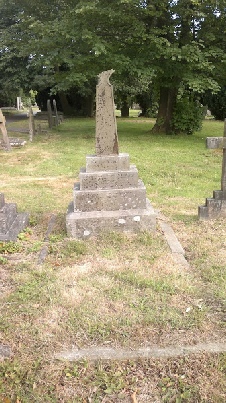Friends of Hastings Cemetery


AI B02
To the Beloved Memory of
My Sister
Gwynneth Agatha Shedden Stonestreet
Born March 1830 at Halton House Hastings
Died on Whitsunday 1882
At 1 Warrior Square St Leonards
Where we had lived together for 32 years
Father in Thy gracious keeping
Leave we here Thy servant sleeping
Also to the loving memory of
her sister
Georgina Mary Rebecca Stonestreet
Born December 14th 1820.
Died 26th June at Zurich
ged 66
And of Mary Elizabeth Shedden Stonestreet
Buried at Hollington 26/06/1887
The Stonestreet sisters were the daughters of daughter of Rev. George Stonestreet,chaplain to the Guards at the Battle of Waterloo, who is in ll Saints.
Fulsome obituaries detail their lives.
Hastings and St Leonards Observer -
FUNERAL OF MISS GWYNNETH STONESTREET. We have this week to record the funeral of Miss Gwynneth Agatha Sheddon Stonestreet, youngest daughter of the late Rev. George Stonestreet, Canon of Lincoln, who died last Sunday week, and was buried on Friday. This lady has resided with her Sister at Warrior square for many years, and was a most zealous worker among the poor, and forwarding all charities for their benefit. In the Sunday School, too, her place as a teacher of a class was rarely vacant, and in her the children have lost a true friend. It is not too much to say that among the poor of her parish she was universally beloved for her general but unostentatious benevolence.
The funeral arrangements were carried out under the direction of Mr. W. J. Avery, of Norman-
The whole choir, too, accompanied the body to the cemetery, and again forming procession, met the body at the gates and preceded it, singing as they went to the grave, where the remainder of the burial service was solemnly gone through by the Rev. C. L. Vaughan. Standing over the grave three more hymns, suitable to the occasion, were sung, and among the large number present in the cemetery many were found who had brought with them tokens of respect, which, being added to those brought on the coffin, made a really grand display, and showed in some slight degree the universal esteem in which the deceased was deservedly held by all who knew her.
In Christ Church, and in connection with all its works of charities, she has been one of the most devoted and untiring workers, and it is a fact that many of its operations were for some time, great measure, supported by the munificence of herself and her sister. Many, yet, do not realise the full extent of their loss, but will be found by one and all of her acquaintances, and more particularly by those that knew her best, that her place cannot be easily filled.—Advertiser. On Sunday evening Christ Church the Rev. E. Bray alluded to the deceased lady at the conclusion of his sermon. He said they had lost valued friend, had laid her to her rest, and now mourned her. He believed they would greatly miss her in times to come. He almost shrank from speaking of the work she had done for them, lest ought he should say would mar the memory of her life. He would therefore confine himself to the facts of the case. How she helped in building that Church some of them knew better than he did, but he could testify to the work she had done in that parish during the past seven years.
Her qualifications and accomplishments were varied and manifold, and of a kind not usually found the same person. Advancing years had prevented her from doing all she would have liked, but her quiet geniality had always secured her the attention of her class of girls in the Sunday School, and the personal regard and love they had for her continued for a long period after school age was passed. Her personal interest in the day school was simply invaluable, and who they were to look for to supply her place at that moment he did not know. As band mistress of the Guild she had been found of great use, but the duty which her success was most signal was that of visiting the sick and the poor. She had a large measure of tact and kindly sympathy, not indiscriminately, and that was one of God's best gifts to woman. He believed it was not the value of the gifts so much that were prized as the kind words, little acts of thoughtfulness, and deep personal interest, which the poor people knew she took in them, and that made her visits the more welcome. Whether it was bed-